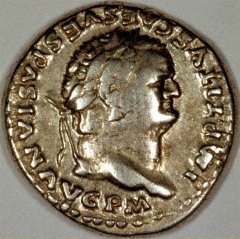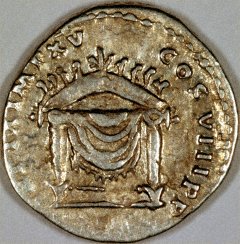| The Very Highest Quality Roman Portraits... |
| Portrait Gallery of Roman Emperors |

| |
|
| |

| |
|
| |
Early Years
Born on December 30th AD39 in Rome, Titus Flavius Vespasianus was destined to be one of the most charismatic emperors of the early Empire. His family's fortunes did not really improve until the reign of Claudius (AD41-54), under whom his father, Vespasian, advanced rapidly and held several senior positions. The family's newly found prominence no doubt played a role in obtaining a court education for Titus who studied with the emperor's own son, Britannicus. The two boys were very close friends until Britannicus' sudden death in AD55 under Nero. As early as AD61, Titus served as a military tribune in Upper Germany and Britain. While in Britain, Titus is said to have saved Vespasian's life and another source records numerous busts and statues in Britain and Germany commemorating his achievements. Returning to Rome in the early months of AD64, Titus embarked on a legal career. It was during this period that Titus married. His first wife died soon after the marriage but Titus married again. His second wife was Marcia Furnilla, the grand-daughter of a former proconsul of Africa. Unfortunately, Marcia's family fell out of favour with Nero and the brief marriage ended in divorce. Titus fathered a daughter, Julia Titi, but it is not clear whether she belonged to his first or second marriage. Julia had a miserable, short life; Domitian, the brother and successor of Titus, had an affair with her and she died in her mid-twenties from abortion complications.
Rise to Prominence
In AD66 Nero gave Vespasian a special command in the East with the task of settling the revolt in Judaea. In response to the crisis, the emperor placed the seven legions in Syria under Vespasian's authority and named Titus as legate of legion XV Apollinaris. The appointment was unusual, for Titus had not yet held the praetorship, a magisterial post normally held by a senator before he became a legionary commander. These appointments show that Nero had great confidence in both father and son. Titus subdued 5 rebel strongholds during the revolt and he became known as a strong and daring commander. With the death of Nero in AD68, the Flavians seized their chance for imperial power. By mid-July, AD69, legions in Judaea, Egypt, and Syria had declared for Vespasian. The Danubian legions soon followed and on 21 December, the day after the emperor Vitellius' death, the senate conferred all the imperial powers on Vespasian. As his father travelled to Rome, Titus stayed in Judaea and began the siege of Jerusalem. The assault on the city began in spring AD70 and by August the Romans had breached the walls. Jerusalem was sacked and the Temple was burned to the ground.
Role Under Vespasian
Titus returned to Rome in June AD71 and took part in a spectacular joint triumph with Vespasian to celebrate the Judaean campaign. The joint celebration was deliberate, as Vespasian wished to waste no time in establishing an heir-apparent to the throne. Consequently, Titus shared in virtually every honour with his father, including the tribunician power, seven joint-consulships and a share of the office of censor. Titus was portrayed during these years as a capable and diligent administrator who attended senate meetings, requested advice, and generally mixed well with everyone. At the same time, the sources offer no indication that he was ever considered a "co-ruler' with Vespasian and it was only upon his father's death on 24 June, AD79 that Titus assumed full imperial powers.
Titus' Reign
From the outset, Titus presented the Flavians as the legitimate heirs of the Julio-Claudian dynasty. He issued a series of coins of previous emperors, the most popular being Augustus and Claudius, which emphasised restoration and continuity. Titus authorized grand and extensive building schemes in Rome, especially the Flavian Amphitheatre, popularly known as the Colosseum. To commemorate the opening of the Amphitheatre, Titus provided a grand 100-day festival with sea fights staged on an artificial lake, infantry battles and wild beast hunts. He also constructed new imperial baths in Rome and began work on the Arch of Titus, a memorial to his Jewish victories. In response to the eruption of Vesuvius in AD79, Titus spent large sums of money to assist the survivors of the disaster; likewise, the imperial purse contributed heavily to rebuilding Rome after a devastating fire destroyed large sections of the city in AD80. As a result of these actions, Titus earned a reputation for generosity and affection for his people. Even so, despite all his financial expenses, he left the treasury with a surplus.
Untimely Death Titus died in September AD81 after only 26 months in office. Suetonius recorded that Titus died on his way to the Sabine country of his ancestors in the same villa as his father. It is true that the ancient sources tend to heroicize Titus, yet based upon the evidence, his reign must be considered a positive one. He continued the work of his father in establishing the Flavian dynasty and he maintained a high degree of economic and administrative competence in Italy and beyond. In doing so, he emphasized the role of the emperor as being a paternalistic autocrat, a model that would serve Trajan and his successors well.
Featured Coin
We show a silver denarius of Titus. The obverse has the laureate head of Titus facing right, and the retrograde (reading anticlockwise from the outside) legend IMP TITUS
CAES VESPASIAN AUG PM.
The reverse design is a throne, with the legend TRP IX IMP XV COS VIII PP.
The titles in the reverse legend enable us to date this coin to the year 80 AD.
Roman Emperors Portrait Gallery
You may wish to visit our portrait gallery of Roman emperors. Although it is not complete, we add new and better coins when we can. We are always keen to buy superior quality Roman coins to upgrade our photo gallery.
If you want to find the value of a coin you own, please take a look at our page I've Found An Old Coin, What's It Worth?
| ...at the Lowest Possible Price |
|
32 - 36 Harrowside, Blackpool, Lancashire, FY4 1RJ, England. Telephone (44) - (0) 1253 - 343081 ; Fax 408058; E-mail: info@chards.co.uk The URL for our main page is: https://24carat.co.uk Chard(1964) Ltd |